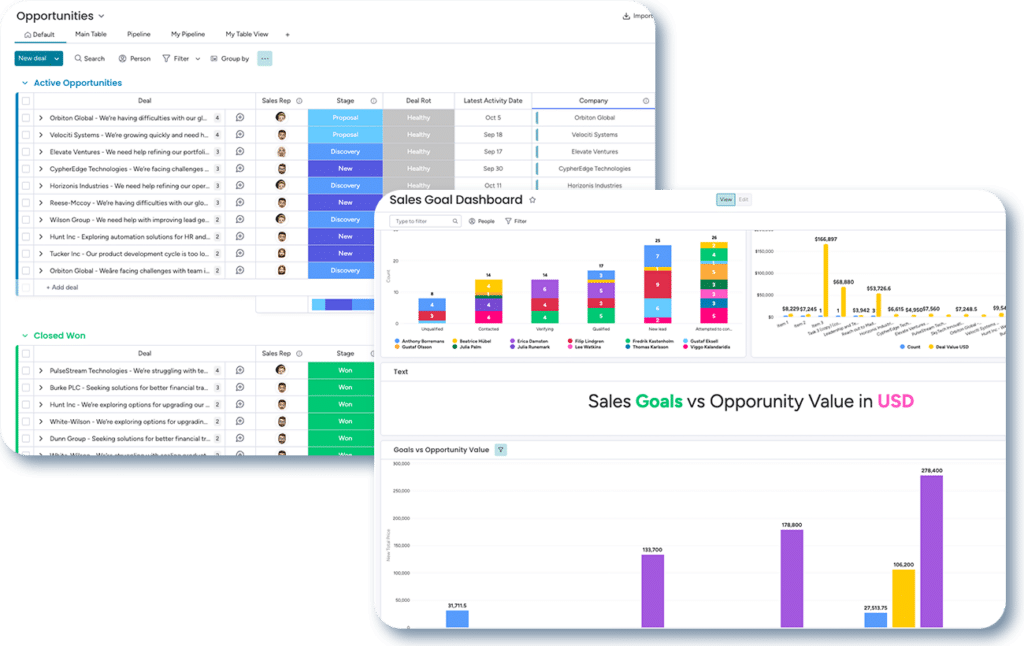Introduction
In the fast-paced world of digital marketing and sales, the significance of using CRM software for managing leads cannot be overstressed. As businesses struggle for attention in an increasingly crowded marketplace, the ability to efficiently manage and convert leads into paying customers stands as a critical differentiator between success and stagnation. Yet, despite its importance, many organizations still grapple with the complexities of lead management. This often results in missed opportunities and potential revenue slipping through the cracks. This is where the pivotal role of CRM (Customer Relationship Management) software comes into play.
Using CRM software for managing leads is not merely about storing contact details or tracking sales activities. It’s about creating a streamlined, systematic approach to nurturing potential customers through every stage of the sales funnel. From the initial point of contact to the moment a lead becomes a loyal customer, CRM software offers a suite of tools designed to optimize these interactions, ensuring no opportunity is lost. However, the journey to effective lead management with CRM is fraught with challenges. These challenges include choosing the right platform, integrating it into existing processes, and training staff to leverage its full potential.
Highlighting the Advantages of CRM
The essence of using CRM software for managing leads lies in its ability to transform raw data into actionable insights, automate mundane tasks to free up valuable sales personnel time, and personalize customer interactions to enhance satisfaction and conversion rates. In this comprehensive guide, we delve deep into the heart of CRM software and its unparalleled advantages in managing leads. We’ll explore essential features, best practices, and real-world success stories to illustrate how businesses, just like yours, have harnessed the power of CRM to revolutionize their lead management processes.
By the end of this exploration, the goal is clear: to equip you with the knowledge and tools necessary for using CRM software for managing leads effectively. Thus paving the way for enhanced sales processes and stronger customer relationships. Whether you’re a small business owner, a sales manager, or a marketing professional, understanding the ins and outs of CRM software is a fundamental step towards achieving your business objectives in today’s competitive environment.
Understanding CRM Software and Lead Management
In the realm of business growth and customer engagement, harnessing the power of technology becomes indispensable. Central to this technological empowerment is CRM software. A tool that has redefined how businesses interact with their prospects and customers. But why is CRM so pivotal, particularly in managing leads? Let’s explore the essentials of CRM software and its inseparable relationship with lead management.
The Basics of CRM Software
At its core, CRM software serves as a multifaceted platform designed to streamline and enhance the interactions a company has with its current and potential customers. It’s a tech-savvy solution that consolidates customer information, documents into interactions, and automates various marketing, sales, and customer service processes. Over the years, CRM has evolved from simple contact management systems to sophisticated platforms that offer end-to-end customer engagement solutions. By using CRM software for managing leads, businesses can centralise their data, making it easier to track customer interactions, manage relationships, and ultimately, drive sales.
Why Leads Management is Crucial for Business Success
Leads are the lifeblood of any business. They are potential customers who have shown interest in your product or service and are on their journey through the sales funnel. However, managing these leads effectively can be a daunting task without the right tools. Mismanaged leads can result in missed sales opportunities and can significantly impact a business’s bottom line. Here, the importance of using CRM software for managing leads cannot be overstated. It helps in organising leads efficiently and ensures that they are engaged and nurtured properly, increasing the chances of conversion.
The Symbiotic Relationship Between CRM and Lead Management
The integration of CRM software into lead management brings about a synergistic relationship that benefits both the business and its customers. This relationship is built on the foundation of data – understanding customer behaviours, preferences, and interactions. By using CRM software for managing leads, businesses gain a 360-degree view of each lead. This comprehensive insight allows for more personalised communication, timely engagement, and ultimately, a higher conversion rate. Furthermore, CRM facilitates the automation of repetitive tasks. As a result, this frees up sales teams to focus on creating meaningful relationships with potential customers.
In essence, CRM software is not just a tool but a strategic partner in the quest for business growth. By using CRM software for managing leads, companies can streamline their lead management processes, making them more efficient and effective. This not only enhances the customer experience but also drives sales, fostering sustainable business growth.
Omnitas Newsletter
Sign up for our monthly newsletter to stay up-to-date on our latest blog articles, videos and events!
Thank you!
You have successfully joined our subscriber list.
Key Features of CRM Software for Managing Leads
The efficacy of using CRM software for managing leads lies in its robust set of features designed to optimise the lead management process. These features not only help in organising and tracking lead information but also in engaging potential customers effectively. Let’s explore the key features that stand out in the realm of CRM software for lead management.
Contact Management
The cornerstone of any CRM system is its contact management capability. This feature allows businesses to keep all their lead and customer information in one centralised location, easily accessible to all team members. It’s not just about storing names and contact details. It’s about creating a comprehensive database where every interaction—emails sent, calls made, meetings held—is meticulously logged. Using CRM software for managing leads with advanced contact management features ensures that every piece of valuable information is captured. As a result, this makes it easier for sales teams to understand their prospects and tailor their sales approaches accordingly.
Lead Tracking and Engagement
Tracking leads through their journey in the sales funnel is critical for effective lead management. CRM software excels in this by offering detailed tracking of lead activities and interactions. Whether it’s a website visit, a download, or an email open, every action is recorded. This continuous tracking, coupled with the capability to score leads based on their engagement level, allows sales teams to prioritise their efforts on leads that are most likely to convert. Furthermore, using CRM software for managing leads enables automated engagement strategies. These include sending personalised emails or alerts to keep potential customers engaged throughout their buying journey.
Analytics and Reporting
Data is a powerful asset in the digital age, and the analytics and reporting capabilities of CRM software turn this data into actionable insights. These features provide a deep dive into the performance of sales activities, the effectiveness of marketing campaigns, and the behaviours of leads and customers. By using CRM software for managing leads, businesses can identify trends, pinpoint areas for improvement, and make data-driven decisions that enhance their lead management strategies. This not only optimises the sales process but also contributes to a more personalised customer experience.
Integration Capabilities
In today’s interconnected digital ecosystem, the ability of CRM software to integrate with other tools is invaluable. From email marketing platforms and social media to customer service applications and business intelligence tools, integration capabilities ensure that CRM software acts as a central hub for all customer-related activities. This seamless integration is crucial for using CRM software for managing leads effectively. This is because it ensures that all customer interactions, regardless of the channel, are captured and accessible. This holistic view enables businesses to deliver a cohesive and personalised customer experience across all touchpoints.
The features of CRM software—contact management, lead tracking and engagement, analytics and reporting, and integration capabilities—form the backbone of effective lead management. By leveraging these features, businesses can not only streamline their lead management processes but also enhance their customer engagement strategies, driving sales and fostering long-term relationships.
Best Practices for Using CRM Software to Manage Leads
Effective lead management is not just about having the right tools. It’s also about utilising these tools in the best possible way. Here, we outline some best practices for using CRM software to manage leads, ensuring businesses can fully leverage their CRM systems to optimise their lead management strategy.
Segmenting Your Leads
One size does not fit all, especially in the context of lead management. CRM software offers sophisticated segmentation capabilities, allowing businesses to categorise leads based on various criteria such as demographic details, engagement levels, purchase history, and more. By segmenting leads, companies can tailor their communication and engagement strategies to meet the specific needs and preferences of different groups. This personalised approach not only improves the effectiveness of sales and marketing efforts but also enhances the overall customer experience, driving higher conversion rates.
Nurturing Leads Through the Sales Funnel
Nurturing leads is a critical step in converting prospects into customers. Using CRM software for managing leads provides a suite of tools to effectively nurture these potential customers through each stage of the sales funnel. This involves timely follow-ups, personalised email campaigns, targeted content offerings, and more, all designed to build trust and maintain engagement. Lead nurturing is about providing value at every touchpoint, and CRM software enables businesses to do this systematically and efficiently, ensuring no opportunity slips through the cracks.
Continuous Improvement with CRM Insights
The journey of using CRM software for managing leads doesn’t end with the implementation of strategies; it’s a continuous cycle of improvement. CRM systems offer detailed analytics and reporting features that provide insights into the effectiveness of lead management practices. Businesses should regularly review these insights to identify what’s working and what isn’t. This data-driven approach allows for the refinement of strategies. As a result, this ensures that lead management processes are always optimised for the best possible outcomes. Continuous improvement, informed by CRM insights, is key to staying ahead in the competitive landscape.
Encouraging Team Collaboration
Effective lead management is not the sole responsibility of the sales team. It also requires collaboration across multiple departments, including marketing, customer service, and even product development. CRM software serves as a central platform where all relevant team members can access up-to-date information on leads and customers. Encouraging team collaboration through CRM ensures that everyone is on the same page. This leads to more coherent and consistent customer interactions. This unified approach can significantly enhance the effectiveness of lead management strategies.
By adhering to these best practices—segmenting leads, nurturing them through the sales funnel, continuously improving with CRM insights, and encouraging team collaboration—businesses can maximise the benefits of using CRM software for managing leads. It’s not just about implementing a CRM system; it’s about leveraging it to its full potential to drive business growth.
Conclusion: Mastering Lead Management with CRM Software
Throughout our exploration of using CRM software for managing leads, we’ve seen the transformative effect of CRM technologies on revolutionizing lead management processes. From understanding the pivotal role of CRM in effective lead management to diving into its key features, it’s evident that CRM is not just a tool but a strategic asset for growth-oriented businesses.
As we journeyed through the best practices for leveraging CRM software—highlighting the significance of lead segmentation, nurturing strategies, and the imperative of continuous improvement—we’ve laid out essential strategies for businesses aiming to excel in the competitive digital landscape.
The Future of Lead Management: Integrating CRM Solutions
As we conclude, the message is clear: to navigate the complexities of today’s business environment, embracing CRM software for managing leads is essential. The decision to integrate or upgrade your CRM software marks the beginning of a journey towards improved lead management and sustained business growth.
If you found this blog post useful, make sure to sign up for our monthly newsletter below. Stay in the loop regarding all things business efficiency and automation!













